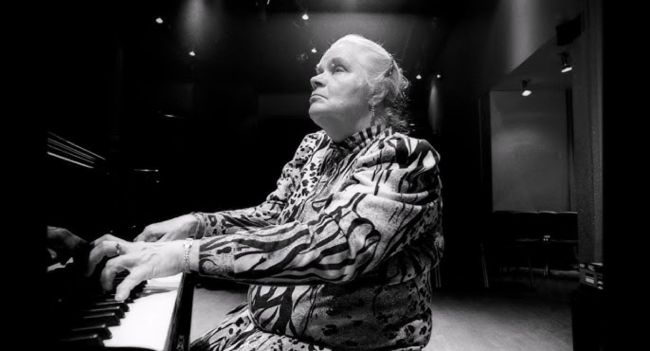I noticed that the esteemed teacher Dimitri Bashkirov, refers to his daughter’s surname, Bashkirova, so the feminine equivalent of Russian names is often taken within a family.
But without having genetic link to a teacher, a student might play as if the fruit had not fallen far from the tree.
What insights we gain from listening to Nikolayeva’s performances, therefore, have DNA ties to her students who were, by osmosis, saturated with her ideas about phrasing, nuance, and yes, life.
I’ve heard stories shared by pupils of Russian teachers, that the experience was bigger than taking piano lessons from week to week. In one case, a well endowed, schmaltzy mentor prepared a favorite borscht recipe, handing a generous jar to the family after classes. Throw in a few bear hugs, and a reminder that piano is life, and life is piano, and you have the ingredients of a well-nurtured, eternal tie that is forever— indelibly carved into memory.
In a retrospective outpouring, Nikolai Lugansky rendered a touching tribute to Tatiana Nikoleva. (“Interviews” at http://lugansky.homestead.com/)
What did you take from the teaching of Tatiana Nikolayeva?
“It’s difficult to explain, in a few words, “Who was Tatiana Nikolayeva”! I would like maybe in ten or twenty years to try to write a book about her! She was like the sun. With her, you knew yourself much better… you could believe in yourself. She was a great musician. I was not only her pupil; we played music for four hands, we listened to music, to concerts. I was her pupil for nine years, until her death. But I was only eight when I made her acquaintance. She held an important place in my life. I recall a great many things about her, above all her love and her hunger for music. She was always listening to it. She said that she could not understand how one could be tired of it – that was impossible ! She was very open to different styles, and listened to other pianists with great pleasure. She was a great example for me, of how to be a human being, as well as a musician.”

What better way to understand the teacher and what she gave Lugansky and others, than by listening to her recorded performances.
First, I was astounded to find this particular posting on Faceboook: Nikolayeva plays the Intermezzo from Robert Schumann’s Faschingsschwank aus Wien that’s memorialized by her student, and generously shared across the Internet.
Now it’s the mentor’s posthumous return to the stage that draws our attention, made more compelling by her teaching relationship to Lugansky:
Tatiana plies phrases, takes her time, not rushing to cadences. She milks Schumann’s inner voices, that are often tucked into a musical fabric and forgotten. She draws out the bass line as if she were playing the strings inside the piano. This reading has an Old World flavor in the best sense of its meaning, as the pianist lulls over phrases, indulging the spirit of a lingering, Romantic character. It’s a passion-infused performance that no doubt seeped into the veins of young Nikolai Lugansky, who now plays it more briskly but with memorable pathos.
Both readings below (teacher and then student) are filled with gut-wrenching emotion.
***
Tatiana Nikolayeva’s artistry is celebrated many times over on You Tube, and if you’re fortunate to speak Russian, here’s an interview with the teacher and a youthful, Nikolai Lugansky.
Translations are always welcomed.
***
Tatiana Nikolayeva (Wiki)
Early life
“Nikolayeva was born in Bezhitsa (now part of Bryansk) in the Bryansk district on May 4, 1924. Her mother was a professional pianist and studied at the Moscow Conservatory under the renowned pedagogue Alexander Goldenweiser (whose other students included Grigori Ginzburg, Samuil Feinberg, Dimitri Bashkirov and Lazar Berman), and her father was an amateur violinist and cellist. She studied piano from the age of three and was composing by age twelve. At thirteen, she entered the Moscow Conservatory, studying with Goldenweiser and Evgeny Golubev. Goldenweiser, who had been friends with Alexander Scriabin, Sergei Rachmaninoff and Nikolai Medtner, stressed the need to develop the highest proficiency in contrapuntal playing. Nilkolayeva graduated in 1948.
“After graduation, she studied composition with Golubev. During this time, she wrote a cantata, Pesn o schastye (Song about Happiness), and two piano concertos. The first concerto, in B major, was recorded with the USSR State Symphony Orchestra under the conductor Kiril Kondrashin.
Career
“In 1950 Nikolayeva gained prominence by winning the International Johann Sebastian Bach Competition, part of the bicentennial marking Bach’s death. More importantly, she met Dmitri Shostakovich at the competition, leading to a lifelong friendship, and was chosen as a first performer of Shostakovich’s 24 Preludes and Fugues. Nikolayeva made three complete recordings of the cycle.
“In 1959 Nikolayeva became a teacher at the Moscow Conservatory, later becoming professor in 1965. She made over 50 recordings during her career, notably keyboard works by Bach, including his Art of Fugue, and by Beethoven, but only became widely known in the West late in life. With the fall of Communism, she found herself in demand internationally, making several concert tours to Europe and the United States. She also sat as a jury member on many international competitions, including the Leeds International Piano Competition in 1984 and 1987. One of her best known recordings is a transcription of Sergei Prokofiev’s Peter and the Wolf, which was released by RCA Victor in Japan. She was known to have had an immense repertoire, and many enthusiasts await the reissue of much of her Melodiya back-catalog.
Teaching
“A teacher for over four decades, Nikolayeva taught many prominent pianists and worked closely with the young Nikolai Lugansky, who went on to great international acclaim.”
